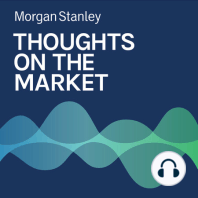3 min listen

U.S. Housing: Will New Lending Standards Slow Housing Activity?
U.S. Housing: Will New Lending Standards Slow Housing Activity?
ratings:
Length:
7 minutes
Released:
Aug 9, 2022
Format:
Podcast episode
Description
As lending standards tighten and banks get ready to make some tough choices, how will the housing market fare if loan growth slows? Co-Heads of U.S. Securitized Products Research Jim Egan and Jay Bacow discuss.-----Transcript-----Jay Bacow: Welcome to Thoughts on the Market. I'm Jay Bacow, Co-Head of U.S. Securitized Products Research here at Morgan Stanley. Jim Egan: And I'm Jim Egan, the other Co-Head of U.S. Securitized Products Research. Jay Bacow: And on this episode of the podcast, we'll be discussing how tightening lending standards could impact housing activity. It's Tuesday, August 9th, at 11 a.m. in New York. Jim Egan: Now Jay, you published a high level report last week with Vishy Tirupattur, who is the Head of Fixed Income Research here at Morgan Stanley, on the coming capital crunch. Basically, rising capital pressures will mean that banks will have to make tough choices in their lending books. Is that about right? Jay Bacow: Yeah, that's it. Basically, we don't think that markets have really appreciated the impact of the combination of how rising rates caused losses on banks portfolios, the regulatory changes and the results of the stress test capital buffers. All of these things are going to require banks to look at the composition of not just the assets that they own, but their business models in general. Our large cap banking analyst Betsy Graseck thinks that banks are going to look at things differently to come up with different solutions depending on the bank, but in general across the industry, expects lending standards to tighten for this year and in 2023, and for loan growth to slow. So, Jim, if banks are going to tighten lending standards then what does that mean for housing activity? Jim Egan: I think, especially if we look at home sales, that's a negative for sales volumes and home sales are already falling. We've talked about affordability deterioration on this podcast a few times now, not just the fact of where affordability is in the housing market, but how rapidly it's deteriorating. If lending standards are going to tighten on top of those affordability pressures, then that just argues for potentially an even more substantial decrease in sales volumes going forward, and we're already seeing this in the data. Through the first half of the year new home sales are down 14% versus the first half of 2021. Purchase applications, that's our highest frequency data point that we have, they're getting progressively weaker each month. They were down 17% year over year in June, 19% year over year in July. Existing home sales, and that's referencing a much larger volume of sales then new home sales, they're down a comparatively strong 8% year to date. But with all of the dynamics that we're discussing, we believe that they're going to see a much more precipitous drop in the second half of the year. We have it down over 15% year over year versus 2021. Now, that's because of affordability pressures. It's because of the potential for tightening lending standards. It's also because of the lock in effect from a rate perspective. Jay Bacow: On that lock in effect, with just 2% of the market having incentive to refinance, lenders are sitting there and saying, well, what do we do in this environment where we can't just give people a rate refi? Now, you mentioned the purchase activity, that's obviously one area, but Black Knight just reported another quarterly record of untapped equity in the housing market, and consumers would love to be able to tap that. The problem is when you do a cash out refinance, you end up increasing the rate on your entire mortgage. And homeowners don't want to do that. So they'd love to do something like a home equity line of credit or second lien where they're getting charged the higher rate on just the equity they take out. But the problem is it's harder to originate those in an environment where lending standards are tightening, particularly given the capital allocation against those type
Released:
Aug 9, 2022
Format:
Podcast episode
Titles in the series (100)
Andrew Sheets: For Markets, Signs, Signs, Everywhere Signs by Thoughts on the Market